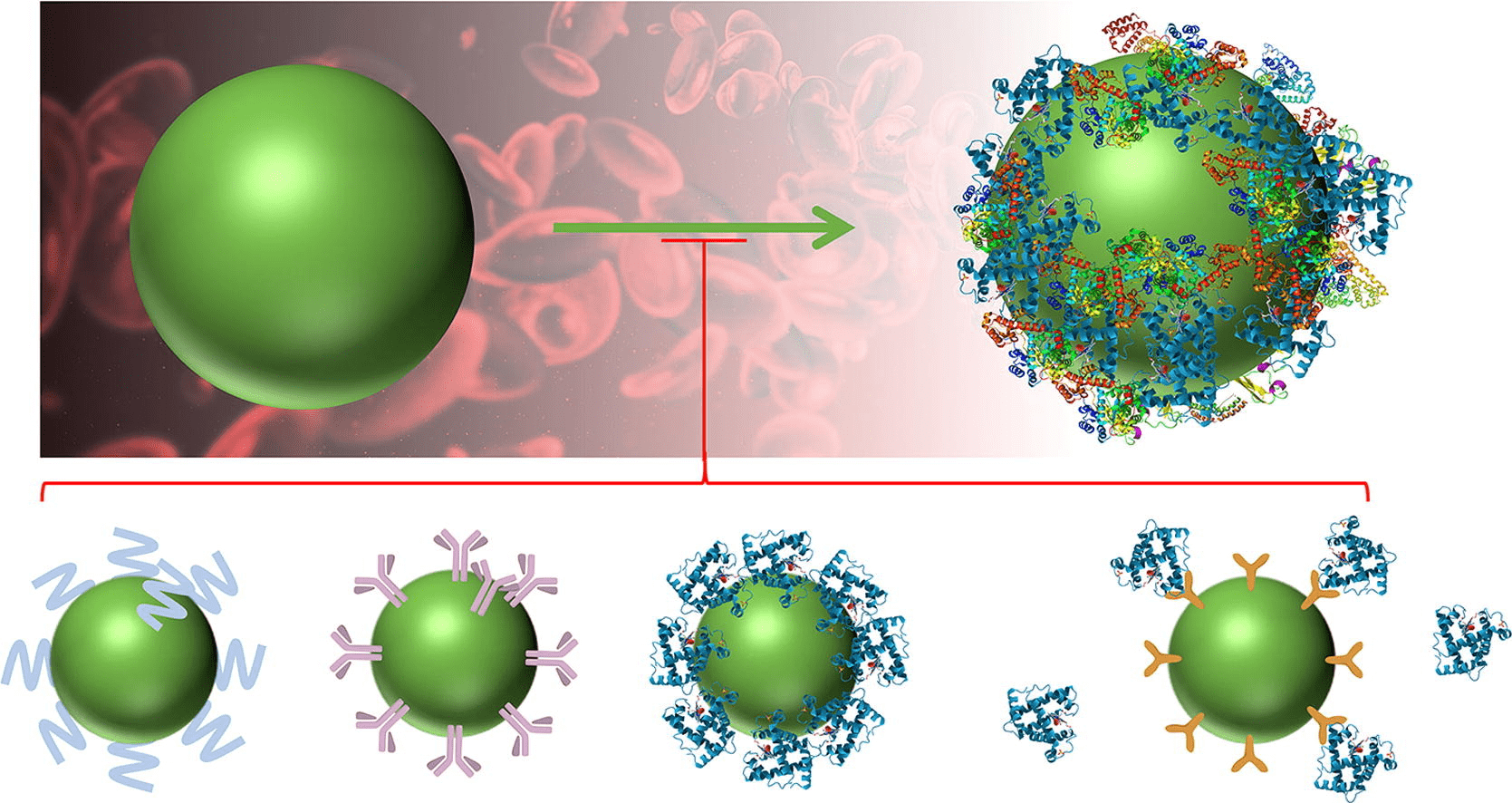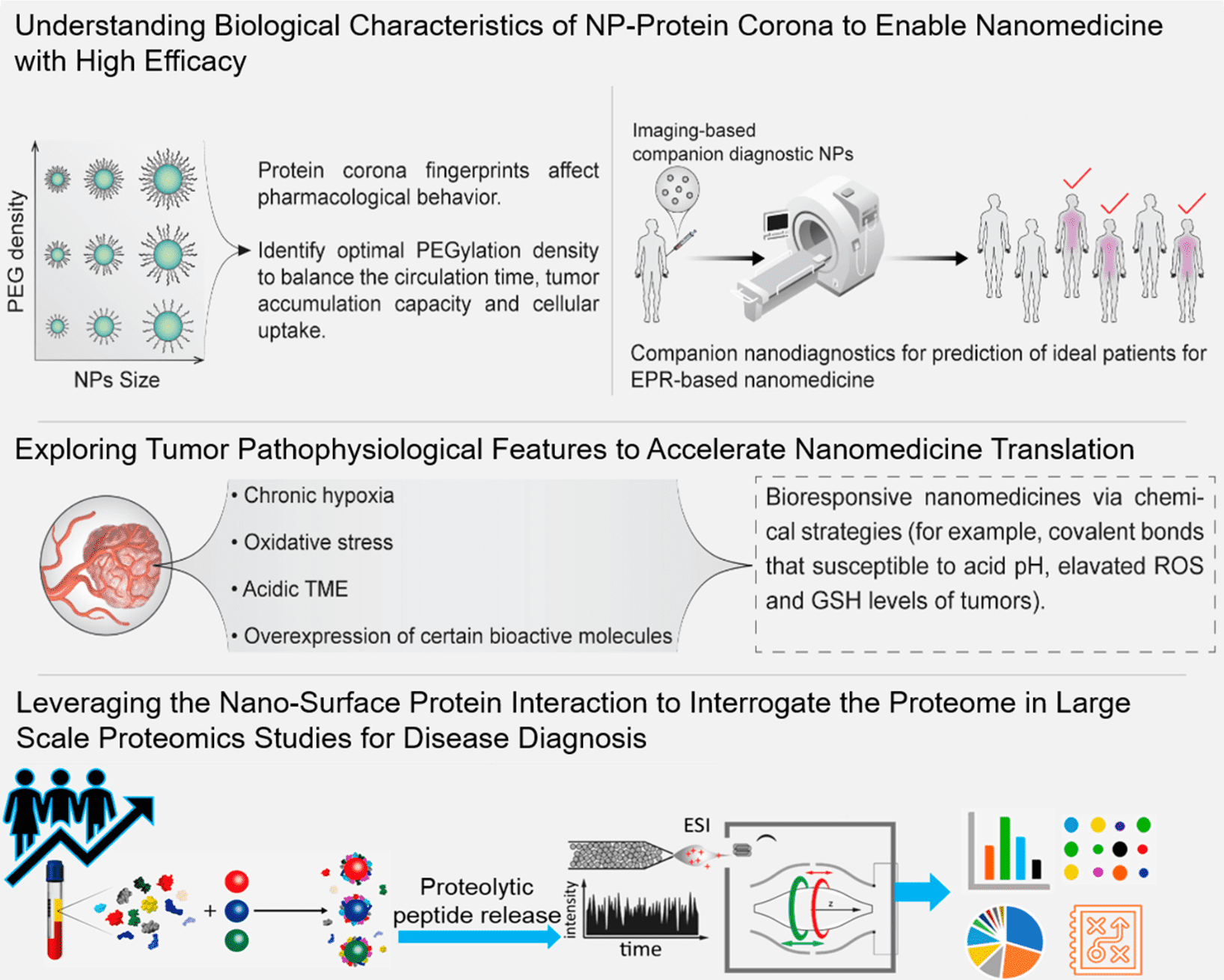Protein Corona
Nanoparticles (NPs), owing to their unique physical, chemical, and biological properties such as controllable size, tunable surface properties, and excellent biocompatibility, have been widely utilized in various fields including cosmetics, food packaging, energy production, and biosensing. Upon release into the environment and subsequent exposure to biological organisms via respiration, ingestion, or dermal penetration, NPs rapidly acquire a protein corona (PC) upon encountering biological fluids.
The PC refers to a structure composed of one or more layers of proteins adsorbed onto the surface of nanomaterials upon exposure to biological environments such as serum-containing culture media or blood. The adsorption of different proteins onto the surface of NPs results in novel physical and chemical properties, leading to varied biological responses in organisms, thus influencing their biological effects. Unlike in vitro environments, NPs with PCs represent their true state within biological organisms. The physicochemical properties of NPs (e.g., size, shape, surface modifications) can influence the composition of the PC. Simultaneously, external environmental conditions (e.g., composition of the culture medium, incubation time, temperature, pH) also play crucial roles in shaping the composition of the PC. The presence of a PC can alter the interactions between NPs and organisms, thereby affecting the biological absorption, distribution, and toxicity of NPs.

Figure 1. Nanoparticle-Protein Corona Structure[1]
Understanding nano-bio interactions is critical for advancing nanomedicine and improving disease diagnostics. This involves: (1) Investigating the biological properties of the NPs-PC to facilitate efficient nanomedicine development; (2) Exploring tumor pathophysiology to speed up nanomedicine application; (3) Employing the interaction between NPs and surface proteins for proteome analysis in extensive proteomics research, aiding in disease diagnosis.

Figure 2. Nano-Bio Interactions in Advancing Nanomedicine and Disease Diagnosis[2]
MtoZ Biolabs offers a comprehensive PC analysis platform, primarily equipped with various mass spectrometers and related auxiliary equipment (high-performance liquid chromatography, HPLC etc.). The platform also features complete data storage, retrieval, and analysis capabilities. Service projects offered by the platform include the preparation and characterization of PCs on various nanomaterials, sample pretreatment for mass spectrometry (MS), classification of samples by HPLC, and MS data acquisition, enabling studies on PC proteomics and NP-targeted delivery, among others. The team can explore optimal experimental conditions through multi-gradient experiments, collect MS/electron microscopy data, and analyze PC composition information through bioinformatics analysis. MtoZ Biolabs provides services including NP preparation, PC preparation, PC characterization, MS data acquisition, and experimental data analysis, offering a one-stop solution for PC-related issues.
References
[1] Kim W, Ly NK, He Y, Li Y, Yuan Z, Yeo Y. PC: Friend or foe? Co-opting serum proteins for nanoparticle delivery. Adv Drug Deliv Rev. 2023 Jan;192:114635. doi: 10.1016/j.addr.2022.114635. Epub 2022 Nov 26. PMID: 36503885; PMCID: PMC9812987.
[2] Liu Y, Wang J, Xiong Q, Hornburg D, Tao W, Farokhzad OC. Nano-Bio Interactions in Cancer: From Therapeutics Delivery to Early Detection. Acc Chem Res. 2021 Jan 19;54(2):291-301. doi: 10.1021/acs.accounts.0c00413. Epub 2020 Nov 12. PMID: 33180454.
MtoZ Biolabs, an integrated chromatography and mass spectrometry (MS) services provider.
Related Services
Protein Corona-Mediated Nanomedicine Targeted Delivery Service
MS-Based Protein Corona Characterization Service | Nanoparticles
How to order?







